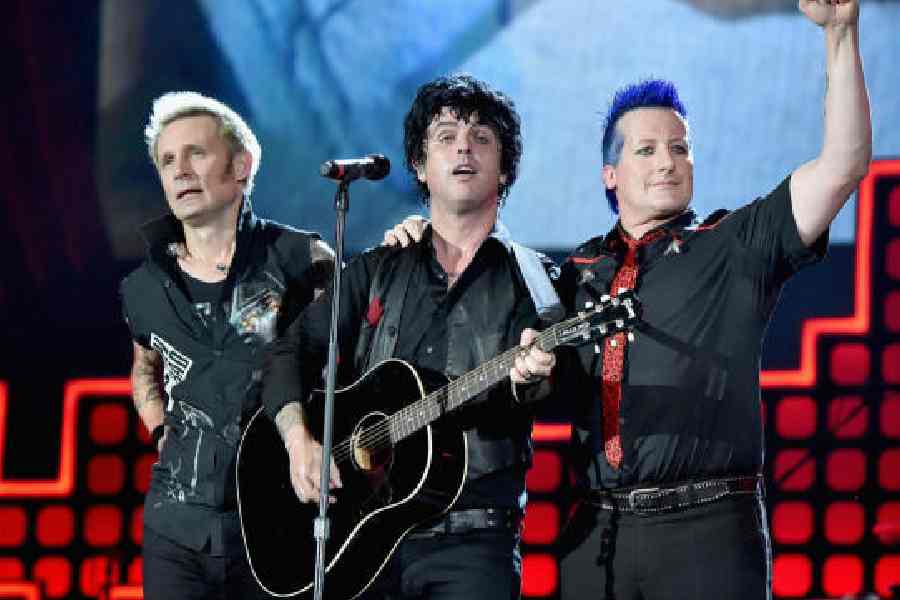In 2012, from September to December, Green Day dropped ¡Uno! followed by ¡Dos! and then ¡Tre!. Going by the album covers, the trilogy looked at paying tribute to the three distinct members of the rock band — Billie Joe Armstrong (lead vocalist, guitarist and songwriter), Mike Drint (bassist, backing and occasional vocalist) and Tré Cool (drummer).
Deep lyrics, thoughtful structure and a unique punk sound were the aspects that added life to the albums and prompted us to keep listening to the unforgettable hits. On the other hand, by dealing with a variety of themes, pertaining to love, promises, and social commentary, the compositions built a permanent residence in a music lover’s heart. To celebrate the 11th anniversary of the trilogy, t2 Campus looks at its favourite tracks from ¡Uno!, ¡Dos! and ¡Tré!
Stay the night (¡Uno!)
It deals with the conflict between time and love. Although the singing voice initially assumes an air of authority, it remains conscious that the relationship it seeks “was never meant to be”. On the other hand, despite such a serious and somewhat melancholic theme, the track is performed restlessly with the energy of garage rock. Simultaneously, while the composition sounds vibrant and assured, the pleading nature of the lyrics accompanied by naive chords adds a cloak of innocence.
However, before the final chorus, the best part of the track arrives when the instrumental break is followed by the bridge. With a carnival of electric guitars and a simple couplet, the track unclothes its soul:
I got to know if you’re the one that got away
Even though it was never meant to be
Stray Heart (¡Dos!)
It is a song about a partner who, exhausted from wandering, realises where they belong. On the way back to the beloved, a promise is made: “I’ll hold your heart and never let go.” To strengthen the message, the singer puts up clever imagery, singing that the beating heart will “never stray again from you”. At one point, the singer even exaggerates:
I said a thousand times, and now a thousand one
We’ll never part
However, despite the exaggeration, the track almost succeeds in reinstating faith in love. While part of it is due to the optimistic performance of Billie Joe Armstrong and part of it is attributed to the linguistic style of the lyrics. With alliterations and end rhyming, the colloquial language of the song delivers a romantic kick:
We’ll never part
I’ll never stray again from you
This dog is destined for a home to your heart
Drama Queen (¡Tré!)
A father is dedicating the song to his beloved daughter who is now old enough to menstruate (“She is old enough to bleed now”). Delicately sung with the humour of a dad, the performance teases a child in the most affectionate manner.
As “her life is now unfolding,” the father takes a moment and meditates on the path that lies ahead. Special attention needs to be paid to the compositional structure of the track. It can be broken down into three parts. While the first part is solely accompanied by acoustic chords, the second part has an additional layer of drums and, finally, there is a blend of an acoustic and electric guitar before the outro.
An interpretation would perceive the tripartite structure as three stages of life. While the simplicity of the acoustic chords signifies a somewhat Edenic childhood, with the drums, life is starting to disclose its true colours. Finally, the introduction of the electric guitar embraces unpredictability as one enters adulthood.
Kill the DJ (¡Uno!)
Like other songs such as American Idiot and Holiday, Kill the DJ attacks the diverse world of commentary — political as well as cultural. In doing so, it critiques the abuse of mass media which robs the subjects of the state of their freedom of thought.
DJ, here, is a substitute for all the political and cultural commentators in society. Just like the DJ who plays a recorded track and provokes someone to dance to an engineered tune, the commentators sell propaganda, brainwash the masses, and lead them to act as per the choices of those in power. So, the extermination of the DJ is necessary for the restoration of sense.
I feel, the post-chorus of the song comprises the most stylish lines in the entire trilogy:
We are the vultures
The dirtiest kind
We’ll cut you once
In your heart and your mind.
Besides the anapestic distribution of the beats and offbeats, the lexical choice is captivating. Being the dirtiest carnivores, the biased commentators and mass media strike not someone’s flesh but their heart and mind. Cleverly expressed.
See You Tonight (¡Dos!)
It’s the opening track for ¡Dos!. And here the singer hopes to catch a glimpse of someone they are missing. Given the fact that the introductory lines open with the word “maybe”, one understands that the meeting has not been planned. However, despite the lack of guarantee, the singer hopes the night will guide and unite the two.
On the other hand, with the calmness of the singing voice, the track sounds like a lullaby:
Maybe I’ll see you tonight
Maybe I’ll see you tonight
Wherever the night takes you
Maybe you’ll see me too.
With the second verse revealing the singer’s desire to walk to the addressee’s door and the bridge conveying a sudden hesitation, it also sounds like an adolescent hoping to see their crush on a prom night.










